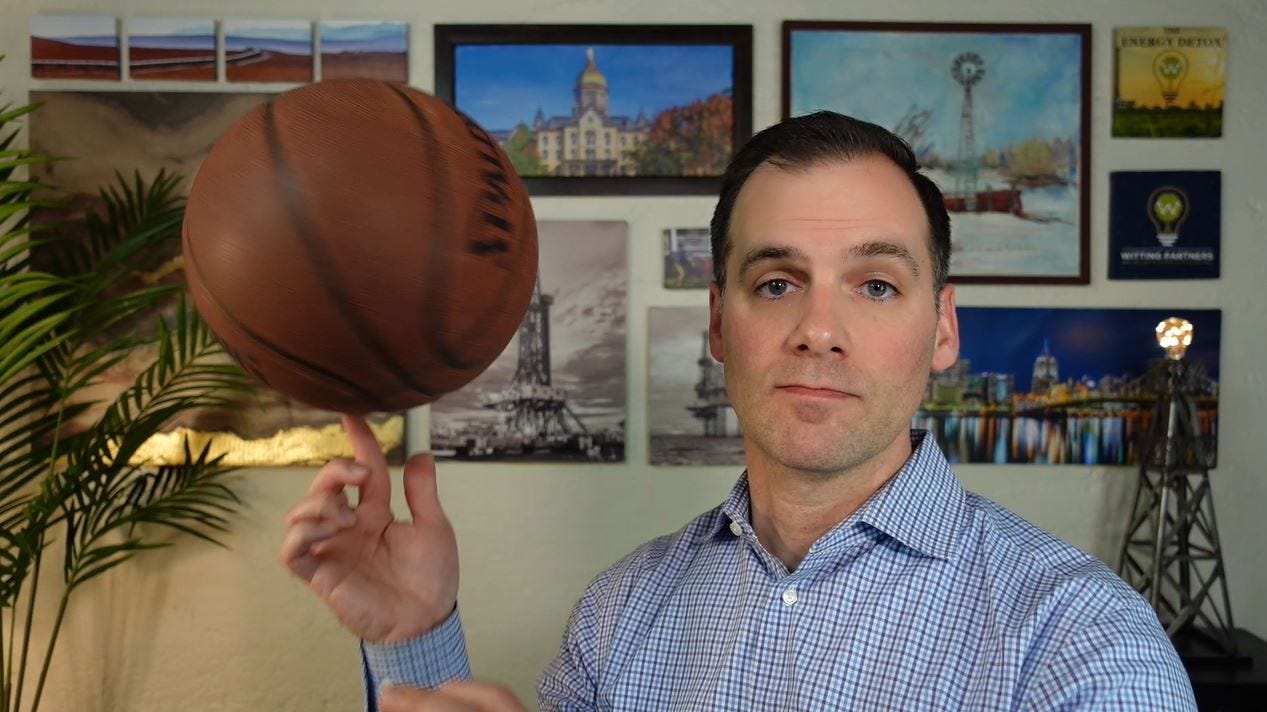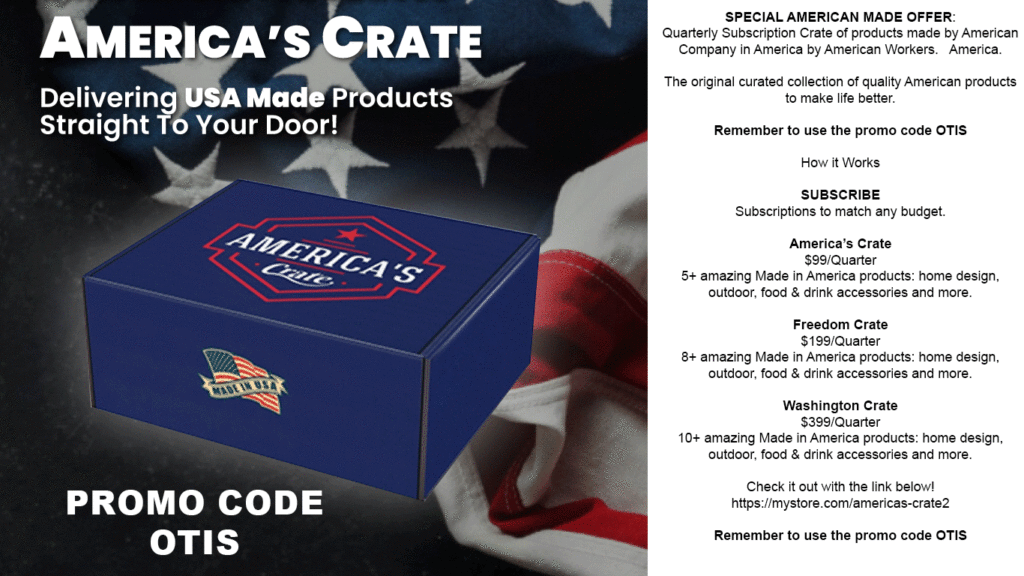Executive Coach Joe Sinnott of Witting Partners and host of The Energy Detox Podcast joined Jason Spiess to talk about expectations in March Madness, role players at work and an update on the Appalachian Marcellus Utica Basin.
During the podcast and interview, the two start off by talking about the Big Dance known as March Madness. From the loss of productivity to gambling brackets to skipping work to watch the game at the bar, it’s a special time of year for managers at work. Sinnott and Spiess pass and shoot around those topics.
Role players. What is your role at work? Much like a player on a team, often times people get caught up with one person and forget role players are just as important to building a success or championship team.
Sustainability is also discussed in detail. Are you learning from your past mistakes or compensating for them? There’s a difference and Sinnott explains how understanding the root of your intention can save your company time, money and turnover.
Plus, Sinnott gives a boots-on-the-ground update on Shell’s $6-billion-dollar ethane cracker plant.
Click on picture for America’s Crate! Check out these Amazing American Environmental Entrepreneurs! Don’t forget that the promo code OTIS unlocks big big savings!
Below is the raw, unedited transcript from our artificial intelligence translator.
Submit your Article Ideas to The Crude Life! Email studio@thecrudelife.com
Jason Spiess
Ladies and gentlemen, boys and girls, Children of all ages. Welcome to the podcast known as the Energy Detox, the Crude Life E S G University. And anything else, Joe that I can get in there with my sports sounding voice. Did you know Joe? I used to be a sports announcer back in the day,
Joe Sinnott
Jason, we’ve had, I don’t know how many conversations, but that is news to me. I was unaware of your, at least that element of your past.
Jason Spiess
So this is the folks, my name is Jason, that is Joe Senate. He is the host of the Energy Detox podcast. Of course, he is the executive coach to the Real life rock stars with winning partners. He is an executive coach primarily in the oil and gas energy sector, but he will certainly go outside of that sector and that’s what we’re gonna talk about today.
We’re gonna talk about outside your comfort zone momentum. I might even talk about a gaffe or two that I’ve made on the air live. That’s what I came up with the Vince mcmahon of the W W E advice. If it happened live, it was meant to be So Joe with that. How you doing
Joe Sinnott
today? I’m doing fantastic, Jason, how about yourself? You know, not
Jason Spiess
too bad. We’re just about an hour away from tip off for the March madness extravaganza. Spectacular for those people who would like a little time stamp on the rationale and the reason for our reindeer games and our craziness to start the podcast off. But my question to you, Joe is, let’s, let’s start right off the bat here because um one of the most difficult things for anybody in any executive leadership role is that balancing of boss and friend.
And right now, everybody knows that people want to gamble, people want to watch the March madness. They want to pay attention to their brackets, they want to check out the scores. This is like one of the biggest weeks in loss of production for workplaces that exists. So talk to me a little bit about how executives can even navigate through this week because that’s one of
those things where the horse is out of the barn, the snowball is rolling down the hill and you kind of gotta deal with it. But at the same time, you can’t really enable it either.
Joe Sinnott
That’s a great question. And the answer of course is the answer to a lot of questions and that’s preparation. So the best thing that, you know, an executive leader or any leader, you know, any manager, even of a small team can do is prepare for the fact that every single year on the whatever it is. Third Thursday of March, March madness kicks off.
People are distracted come lunchtime and you know, it shouldn’t come as a surprise. But as is the case with many humans, when you’re caught off guard, you’re not aware, you’re not preparing. That’s when you make a short sighted decision in terms of, you know, cracking down on people and saying no, you can’t, you know, escape to the local watering hole to, to enjoy games.
So, I mean, the first thing Jason is if you have the time to prepare or if you didn’t prepare this year, you know, get your ducks in a row for next year. So that when March madness rolls around yet again, you can actually take advantage of it and use it as an opportunity to connect more with your employees and ensure maybe even more productivity in the, in the week or so leading up to March Madness instead of, you know, acting like the kid who, uh you know, didn’t do his homework to the last
minute and something happened and then, you know, he’s stomping around because he didn’t get to go out with his friends or do something fun. Well, guess what? Little preparation, a little bit of awareness, especially when it’s on the calendar. Basically, uh you know, indefinitely Until they expanded to like 128 teams. And, you know, things move forward a week or two.
Jason Spiess
Yeah. And that’s another, that’s a whole other podcast for another day. But I, I was gonna ask you about, you know, just kind of, some people are doing it from a team building standpoint, other people, of course, they just do not allow anything like it in the office. So, it all depends on the workplace and a lot of people have embraced it and figured out ways to channel and redirect that energy as opposed to resist it.
So, uh let’s talk a little bit about expectations now because I found it very interesting, you know, last year. Of course, it was ST Peter Wright. ST Peter’s had the big magnificent tournament run that was last year. Right.
Joe Sinnott
Yeah, that was last year …
Jason Spiess
And they were a 15 seed and it’s pretty rare for a 15 seed to win one game, let alone several games. So it was, it was rather interesting in seeing some of the media headlines leading up to this, that there won’t be another ST Peter’s and who is gonna be the Goliath that goes down and, you know, the speculation comes out, the speculation comes out and so relate that a little bit to the business world because sometimes you get a new employee and boy there, man, they, they’re like a fax
machine and a waffle maker put together. That’s an old Simpsons joke, man. I just dated myself there. But, you know, a lot of times the sizzle doesn’t match the steak and sometimes the steak is everything with no sizzle. So, talk to me about expectations, especially, you know, given that we’re in that March madness time when there’s upset specials and people are generally wrong out of the gate. So,
Joe Sinnott
well, I mean, I think you can call it expectations Jason or you can call it just the law of probabilities, you know, for all the gamblers that love this time of year, it’s all odds, right? It’s all statistics and in terms of the expectations of a new employee or of some business plan that was put in place three months ago, that now seems obsolete.
Obviously, things are gonna change and the leaders that are the most successful and sustainable if you will are the ones who have almost cold hearted view of risk and statistics And odds and when you boil it down to, yeah, there’s a, you know, whatever 15% chance that this new hire is gonna fail miserably and that we missed something. Once you accept that, then you can ask, you know, the next questions for the next higher to say.
All right. Well, what are all the ways to prevent that from happening in the past or to reduce the odds of a major upset if you will. And that’s again, were a lot of leaders who are humans. I only work with humans at, at this point in my career as a coach at least. But, you know, humans tend towards the emotional side of things. It’s, you know, it’s in our nature, but when you can boil it down to exes and ohs and statistics and say, all right, what are the finite risks to this new hire,
succeeding or again, whatever business need is out there or business decision once you can do that, Jason, and, you know, you can then start tackling specific threats, specific risks, specific challenges. It’s a lot easier to get people on board and motivate them. Then if you’re just their arm waving and huffing and puffing and looking upset because, you know, you’ve hired three people in the last couple of months and all of them turned out to be dud.
So that’s again, and I say that, you know, working with a lot of technically minded people so that tends to resonate with them. But I think for anyone who can boil it down to numbers and again, the exes and ohs just like a game plan. And, uh you know, in the sport of basketball, it sets you up for a much more, um you know, unbiased, straightforward conversation that’s gonna resonate with your audience or your, your fans, so to speak.
Jason Spiess
A lot of times in sports, their role players, in fact, most teams have role players and when you look at an office, a lot of times they’ve got role players too. And sometimes I think that we get caught up on so polarizing our ideology and our thoughts that we forget there’s five teams on a basketball team and that player that got four steals, six rebounds and three assists actually was probably the most valuable player on that game because all of those stats came at times when they
were needed as opposed to just the regular day to day stuff. Now, the star athlete who got all the kudos, yeah, he scored the most points and he did all the filler work and he’s the day to day work horse. But there are those players that I I of course, think of Ray Allen, one of the best college basketball players in his twilight years in the N B A. He went to play for the Miami Heat and he was basically there to shoot three pointers with a minute left and that’s what he did and they won an NBA
championship because Ray Allen knew how to shoot. I think it was, it was the Celtics or the heat, but he was able to basically shoot three pointers with a minute left and he was a clutch three point shooter. And sometimes when I look at, you know, conferences and going to that big meeting and these other things, I think we get kind of almost one side and we forget that that grizzled old veteran, they can bring a lot of wisdom into this and that young rookie man, they can bring a spark into
this like we’ve never seen. And that middle of the road kind of beaten down middle management person. Well, they’re probably your filler, they’re probably the person that’s gonna do the heavy lifting at that point. So Joe, talk to me a little bit about the role playing that certain organizations should be taking on, on a regular basis.
Joe Sinnott
Well, this comes up not necessarily in the way you put it, Jason, but this comes up a lot in organizations that I work with because people, you know, individuals who have specific roles, many of them cannot articulate how their role, their job is connected to the company’s bottom line. And that’s a huge failure. You can argue it’s a failure in governance, right?
When a company has, you know, hundreds if not thousands of employees and a and a significant number of them, they know their role, but they don’t know how it’s actually connected to that company winning, you know, to, to pull in some sports analogies here. So that’s the first thing to address is to help those individuals quantify their role, how are they connected to the bottom line?
Because if they’re not connected, then obviously there’s something wrong. But when they can see how their actions and their responsibilities actually contribute to the continued success of their team of their company that changes the conversation, right? You’re, you’re less likely to have people get lost. And on the flip side, Jason, you’re less likely to over promote the individuals who have might have the highlight reels and the sexy stats, but that once you actually
quantify their contribution to the bottom line, it’s maybe not as great as somebody would have guessed from the outside. So that’s again, if that makes sense to you, Jason, that’s a lot of what I do because when I’m working with people, one on one, that’s one of the first questions is, hey, how are you? And how are your team connected to the bottom line and helping them answer that question is one of the first things to understand.
Alright, well, how the heck are you expected to collaborate better with your teammates and other departments? If you don’t know your value, you don’t know your role basically, Jason. Um and in many cases, you don’t know how valuable you really
Jason Spiess
are. All right now we got a Mike and Phil Jackson this because now you’ve got to manage the egos because now you’re an employee. I’m sorry, you’re, you’re, yeah, you’re a coach or you’re a manager or you’re a executive that’s got to manage all these type a personalities that were just told their whole life how special they are and then they got hired and just told how important their job is.
They’re the most important person in the company you got, you know, Joe, there are C E O s who have told me that before. Okay, I was at a hotel At a hotel as a restaurant manager being told I’m the most important employee out of the 3000 employees in that whole place. Not the housekeeping staff, that poor woman that’s dealing with 90% turnover.
But anyways, so shout out to all, all the housekeeping staff in the hospitality industry. My heart goes out to every single day. Uh Joe, talk to me about managing some of those egos and type a personalities because whether it’s in sports or business, that is a really, really difficult thing to do.
Joe Sinnott
Yeah. Well, I agree 100%. It is a really difficult thing to do. And one of the best approach is not foolproof approach, but one of the best approaches is to basically ask them. So what, you know, when they’re, where they become so proud of some system they put in place or something, they, you know, if their new hire that’s brought in at some, you know, a senior level position, okay, they might be bringing some knowledge, some experience, some results from, from a prior role, but it
doesn’t matter how does it matter. So what, and just having them answer that question again, thinking through how they can leverage it. That’s a good thing, right? How can they build upon their prior successes? Whether again it’s from, from an external, uh point of view or even internally if they’ve grown through the ranks, asking them, you know, how applicable it really is or how they can build upon that and not just sort of kind of settle in and say, hey, look, I’ve got my role,
I’m here until they kick me out the door or, you know, force me into retirement or, you know, whatever the sports equivalent of that would be. And what that does, Jason, it starts to breed a culture, a sense of innovation, continually building upon the existing talent and not sort of stagnating and keeping the spotlight on any individual.
And that’s the key because if you don’t do that, Jason, you know, as cliche as it sounds, you’re gonna get these silos, right? And you know, everybody’s gonna be working towards some intermediate goal and lose sight of the fact that you wanna win, you wanna win, you know, certainly games. But here in March, you wanna win the whole tournament, right?
And that’s what happens with people that have maybe outsized egos if you will and you know, a pride that’s based in, in form of results, which is again, not, not a bad thing necessarily, but by and large, the problem is they start managing their own little team and again, they lose that connectedness to the bottom line, which is no different from somebody that might be eight rungs down on the ladder within the organization who doesn’t even have a glimpse of the bottom line, whether
it’s that person who’s all the way down the line or whether it’s a person towards the top, if they can’t visualize how everybody is connected then. Yeah, you’re gonna get into a position where people just think they’re the most important person out there or on the flip side, they don’t even realize that they’re important at all. Both of those are toxic. Both of those are damaging and both of those cost companies, a lot of time, a lot of money and a lot of energy.
Jason Spiess
Hey, are people doing corporate retreats anymore? Um, in your world, I’ve, I’ve seen a real decline in corporate retreats in the last five years. Have you seen many of them? And where I’m going as cabin fever and spring and, you know, that’s that kind of thing. And those corporate retreat streets used to be a great way to satisfy a lot of that cabin fever and, yeah, I’m up here in the north of the Mason Dixon line.
We’ve had a lot of snow and a lot of negative temperatures this year and you’re up in Pittsburgh. So, um just curious, just, you know, anecdotal, just, you know, just your observation.
Joe Sinnott
Yeah, anecdotally. It is definitely less. But it’s interesting because a lot of companies are trying to fill the void of, you know, the pre COVID pre pandemic world of boondoggles and big gatherings and things like that. We get a little bit of Kumbaya and maybe a lot of bit of drinks and food and all of that. So I have not seen any organizations who have sort of cracked the code on how to, to get all those benefits, Jason. But anecdotally, yeah, it’s definitely less and it’s still
talked about perhaps. But, um, this is a different world and people are more in tune with. All right, what do people actually want? And it depends there. Of course, if you lean towards remote, still, if you, if you lean towards in person, if you, if your hybrid, clearly all of that plays into the potential value of one of those off sites or boondoggles or uh somewhere somewhere in between there in terms of the language, …
Jason Spiess
listening to you speak. I was thinking that COVID probably had a lot to do with the decline as well. And, and, and so people are kind of resetting and right setting and doing all these different things with their company trying to figure out how to even get their employees back in the office, let alone have a corporate retreat. So, but anyway, that’s, that’s where we’re at is, you know, people are just kind of figuring out what their new norm is and, and we’re getting there.
Actually, I think a lot of people are already there and that kind of next wave is starting to come in a little bit. And um you know, when, when we’re talking about spring, we’re talking about cabin fever, we’re talking about new beginnings if you will. Uh R E S G University has been tracking layoffs. Linkedin has been tracking layoffs. There’s been an abundance of layoffs this year.
So a lot of people are going through new beginnings. So whether it be just the spring of the fresh coat of paint or the fresh coat of Easter egg dye, if you’re a pause pan or whether, you know, you got laid off and you have to go get a new job or whether you just start having a new beginning. What, what’s the advice for people this year, Joe,
Joe Sinnott
if you’re going through a new beginning and you’ve landed somewhere in a new company, if it’s so if you’re, if you’re at that stage of the new beginning, the key is to take advantage of that excuse, the excuse to ask a ton of questions, the excuse to be ignorant. Now, successful leaders are always taking advantage of ignorance. They’re always, you know, unafraid to sound like the dumbest person in the room for most audience, at least internal audiences externally.
Sometimes you got to uh you know, you might have to, to put on a face and pretend like, you know, a little bit more than you do. But internally having that humility, having the ability to, to ask some dumb questions. Take it advantage of it. You’re, you know, a new kid on the block, take advantage of it for people who have not yet landed a new job.
You still have lots of excuses, of course, but they’re a little bit different right there. Excuses to, you know, revisit your personal life a little bit more revisit your timing, you know, understand what actually drives you and motivate you. You might have the ability to think a little bit more clearly than you did if you were working, you know, 60 70 hours a week at some jobs.
So taking advantage of those excuses that are unique, whether you’re in between jobs or whether you’re just, I got a new job, those are fairly or hopefully fairly narrow windows in the grand scheme of a, you know, 30 plus year career. So take advantage of those unique situations, whatever that means to you again, it’s open ended, right? What are all the ways to take advantage of this unique situation?
And a lot of people, Jason and it sounds so simple. A lot of people don’t view it that way, right? It’s like they’ve already fast forwarded to, you know, they’re gonna get their, their next job, maybe it’s a dream job and like they’re already projecting three years into that job and just wait a second. Let’s, you know, it’s just what, what leverage do you have now?
What freedom do you have now that you might not have couple months down the road? So that’s from a mindset standpoint, Jason, that’s the best thing you can do when you’re facing a new beginning is just recognize this is unique. How can you take advantage of it and treat this like it’s a um, you know, it’s a, it’s a once in a lifetime experience, right?
For all those kids that are playing in the N C double A tournament for the first time, perhaps the only time, right? This is their, their one shining moment, so to speak. How do you take advantage of it? How do you soak it in so that you don’t regret this unique opportunity that’s in front of you.
Jason Spiess
You know, I think listening to you speak, I was kind of reflecting on my past a little bit and I think one of my biggest problems has been that rather than learn from my past, I’ve been trying to compensate for my past and that that’s a different approach. And I definitely should be learning from my past than trying to compensate for the past because when I compensate, I get stubborn and I just don’t see the trees for the forest and the reality for what it is.
And sometimes I wonder if that’s um spring related personality related or just, you know, um just human related Joe has that ever come up in your world that people are compensating rather than learning from the past.
Joe Sinnott
It does. And actually even the words you’re using there, Jason, I think sometimes even learning from your past can be a bit of a pejorative right? You’re learning from your past, that implies that maybe you made some mistakes are mistakes were made and you know, again, that could cause you to want to compensate. I would say just from a visual standpoint, building on your past, that’s a much more positive.
I mean, there’s a visual right there even learning, right? When people think learn a lot of times they just default to sitting in a classroom and ingesting information, which is fine, there’s a purpose to that. But you know, what do you then do with it? You want to build something you want to grow, you want to develop. So even just from the language that you use, when I’m listening to people talk and tell their stories or talk about problems, they’re happening, sometimes it’s
something as small as that and say, okay, well, how we gonna build on your past experiences? How are you going to leverage those? How are you gonna move further faster? Whatever the case is? So that’s again, it, that’s the first step. Sometimes just changing your language. Jason and it’s not enough to just learn and intellectually understand what you could have done differently and how you’re gonna do things moving forward.
It’s hey, where can I go now that I couldn’t have gotten too if it weren’t for those prior experiences. And maybe what I just said, there is a fancy way of saying compensating. But regardless my mind, at least when I hear that, you know language, it’s your starting in the whole. So start positively use those language build, grow, develop, etcetera.
Jason Spiess
You’re talking to a guy that takes the words all the way down to the symbols that are involved. So you’re, you’re, you’re speaking my language big time on that. Um What’s, uh, let’s change gears a little bit here. What’s happening out in the east coast? Marcellus utica? Apple is Appalachia? Is that the 3rd, 3rd term that’s used out there? Occasionally?
Joe Sinnott
Appalachia or Appalachia depends where you are. I’ve heard different rules of thumb in terms of who says Appalachia and who says Appalachia. But uh yeah, you’re, you’re welcome to call this the Appalachian region if you will, the Appalachian Basin, but certainly the majority of the gasses coming from our beloved Marcellus and Utica shales here these days.
Jason Spiess
So the last time we checked in, there was there was gonna be a cracker plant, not, you know, not a Triscuit cracker plant, but it sounds like like some sort of ethane plant that was gonna be cracker in out there. So, do we have an update on that or is that pretty much the same old, same old, it’s
Joe Sinnott
still cracking away up there. You know, there’s still occasionally you’ll read some headlines about some, you know, additional thing that needed to get done or is, is finally in line. I think I just saw a couple of days ago, I think uh you know, they installed some new air monitors at the plant, but it’s been operating, it is running and uh it is, you know, it is doing its job there.
So really no update I guess Jason other than it’s, yeah, it’s clicking along there. That’s the Shell Cracker plant in Beaver County. So, just outside of Pittsburgh here,
Jason Spiess
Beaver County, outside of Pittsburgh. Okay. And where, what is that cracking, I guess? Is it, is it just gas, is there other things involved? What types of gas do you know that much into it yet? I mean, it is a pop quiz. So
Joe Sinnott
it’s actually pretty straightforward. So, you know, in the natural gas stream, most of what you have typically is methane. But you also have, you know, lots of other ma molecules and those other molecules are heavier, they’re bigger, they’re called, you know, NGL natural gas liquids. And one of those is ethane and methane is a key ingredient. You know, it takes a couple steps but you crack the ethane and you produce these little pellets basically that go on to produce all the
plastics that our world lies upon. So it is the ethane stream from the natural gas that we produce here. That is the reason that shell, you know, stuck that plant where they did because we got a lot of gas and in that gas is a sufficient supply of ethane to be cracked and to be turned into lots of the products that we enjoy on a daily basis.
Jason Spiess
Of course, a lot of people might be wondering what we’re kind of talking about, but there’s butane and there’s methane and there’s, and there’s pent Ain. That’s when I realized I was out of my element in my early days of the oil and gas industry. I was interviewing John Gibson from one Oak and he threw out the word plantain and I looked at him and I thought, boy, you’re just making stuff up
now because I’d never heard that before. But, hey, he was right. I was wrong. Imagine that Joe, the energy expert was right. And the podcast host was wrong, boy, you could.
Joe Sinnott
So I’ve learned two things now. So I’ve learned that in your former life, there was a little bit of sports commentating and I’ve also learned that there’s at least one time that you’ve been wrong. So those are two things that I’ve learned here on the crude life during this conversation. Jason …
Jason Spiess
anyway and close. Did what? Any final thoughts, any final words as we kind of lead right into spring here.
Joe Sinnott
Final words. Well, I mean, I guess sticking with the, you know, what’s going on here in the world of the Marcellus natural gas prices of course, are low. They dipped, they were, they were high at one point last year and now they’re low. And in terms of the ups and downs of the industry, there’s no question that, you know, it’s like it happened overnight almost.
But, you know, people are starting to worry again. They’re starting to question how long, you know, things are gonna be able to click along at the current pace and you know, that could take its toll on people. So what I would say is, and again, this comes out and a lot of the conversations I have with a lot of the people that I work with focus on what’s not changing, right?
You’re part of the energy industry, ups and downs. That’s part of the game. So focus on what is not changing and what you can control. And as cliche as that sounds, Jason sometimes it takes a reminder to say, hey, you know what, at the end of the day at gas prices are going down, but, you know, 95% of the other variables, they’re unchanged, they’re still in play and most of those variables, quite frankly, Jason are people and relationships and connections and your reputation, all of
those things are unchanged and most of those things you can control pretty easily. So that’s what I’d say to people, you know, as they look at gas prices and even oil prices, I think oil prices just dipped another, what, $3 yesterday. So, um, just keep that in mind and, you know, you don’t, you know, seasoned veterans of the industry, of course, we’ll talk about all the ups and downs they’ve been through and how they’re hardened to it.
But the reality is most of them still sort of feed into the, to the ups and downs and the swings. But if you’re in a leadership position, you can’t let that happen. That’s, that’s it. So, try not to give much advice in our conversations here, Jason. But you know, my advice to any leaders that are out there listening is be mindful of the words you’re using just like we talked before you.
No words are important. And if you’re conveying a sense of doom and gloom, unnecessarily, well, you’re setting yourself up for failure, you’re setting your team and your, your company up for failure. And you know, the odds of you making it through a grueling period, like the three weeks of March madness here in the six games that teams need to win or seven games. If you’re one of the playing teams that won earlier this week, you know, you’re not gonna make it if you’re, you know,
have any, any inkling of negativity and doubt that you’re sharing with your team. So maybe that’s my, my final word here. Weaving together the world of March madness in the world of ever decreasing and increasing and decreasing and increasing and decreasing commodity prices.
Click on picture for America’s Crate! Check out these Amazing American Environmental Entrepreneurs! Don’t forget that the promo code OTIS unlocks big big savings!
Submit your Article Ideas to The Crude Life! Email studio@thecrudelife.com
About The Crude Life
Award winning interviewer and broadcast journalist Jason Spiess and Content Correspondents engage with the industry’s best thinkers, writers, politicians, business leaders, scientists, entertainers, community leaders, cafe owners and other newsmakers in one-on-one interviews and round table discussions.
The Crude Life has been broadcasting on radio stations since 2012 and posts all updates and interviews on The Crude Life Social Media Network.
Everyday your story is being told by someone. Who is telling your story? Who are you telling your story to?
#thecrudelife promotes a culture of inclusion and respect through interviews, content creation, live events and partnerships that educate, enrich, and empower people to create a positive social environment for all, regardless of age, race, religion, sexual orientation, or physical or intellectual ability.
Sponsors, Music and Other Show Notes
Studio Sponsor: The Industrial Forest
The Industrial Forest is a network of environmentally minded and socially conscious businesses that are using industrial innovations to build a network of sustainable forests across the United States.
Weekly Sponsor: Stephen Heins, The Practical Environmentalist
Historically, Heins has been a writer on subjects ranging from broadband and the US electricity grid, to environmental, energy and regulatory topics.
Heins is also a vocal advocate of the Internet of Everything, free trade, and global issues affecting the third of our planet that still lives in abject poverty.
Heins is troubled by the Carbon Tax, Cap & Trade, Carbon Offsets and Carbon Credits, because he questions their efficacy in solving the climate problem, are too gamable by rent seekers, and are fraught with unreliable accounting.
Heins worries that climate and other environmental reporting in the US and Europe has become too politicized, ignores the essential role carbon-based energy continues to play in the lives of billions, demonizes the promise and practicality of Nuclear Energy and cheerleads for renewable energy sources that cannot solve the real world problems of scarcity and poverty.
Look at what’s happened to me.
I can’t believe it myself.
Suddenly I’m down at the bottom of the world.
It should have been somebody else
Believe it or not, I’m walking on air.
I never thought I could feel so free-e-e.
Barterin’ away with some wings at the fair
Who could it be?
Believe it or not it’s just me
The Last American Entrepreneur
Click here of The Last American Entrepreneur’s website
Studio Email and Inbox Sponsor: The Carbon Patch Kids
The Carbon Patch Kids are a Content Story Series targeted for Children of All Ages! In the world of the Carbon Patch Kids , all life matters and has a purpose. Even the bugs, slugs, weeds and voles.
The Carbon Patch Kids love adventures and playing together. This interaction often finds them encountering emotional experiences that can leave them confused, scared or even too excited to think clearly!
Often times, with the help of their companions, the Carbon Patch Kids can reach a solution to their struggle. Sometimes the Carbon Patch Kids have to reach down deep inside and believe in their own special gift in order to grow.
The caretakers of Carbon Patch Kids do their best to plant seeds in each of the Carbon Patch Kids so they can approach life’s problems with a non-aggressive, peaceful and neighborly solution.
Carbon Patch Kids live, work and play in The Industrial Forest.
Click here for The CarbonPatchKids’ website
Featured Music: Alma Cook
Click here for Alma Cook’s music website
Click here for Alma Cook’s day job – Cook Compliance Solutions
For guest, band or show topic requests, email studio@thecrudelife.com
Spread the word. Support the industry. Share the energy.























The Crude Life Podcast: Joe Sinnott, Witting Partners and The Energy Detox Podcast